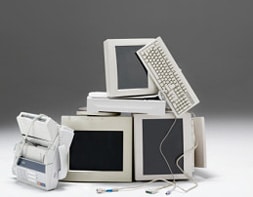When you buy a new cell phone or laptop, the old one usually just lies gathering dust in a drawer. Other electronic waste such as televisions and computers are either stored in a junk cupboard or left out on the curb.
But hoarding electronic waste or leaving it out on the sidewalk for someone to pick up is not the best way to deal with it. There are better ways to dispose of electronic waste that not only reduce the trash in your home, but can also have other benefits.
Read more to learn what exactly electronic waste is, why it should be properly disposed of, and how and where you can dispose of your electronic waste.

What is Electronic Waste?
Electronic waste, or e-waste, comprises discarded electronic products, such as:
- Televisions
- Mobile phones
- VCRs
- DVD players
- Copiers
- Fax machines
- Stereos
- Printers
- Speakers
Many of these products can be resold, reused, refurbished, and recycled.
Why Should You Properly Dispose of Electronic Waste?
Many electronic devices contain hazardous material. Dumping e-waste with normal garbage can pose a host of dangers to animals, humans, and the environment.
For instance, hazardous chemicals from e-waste can leach into the soil and contaminate it, making it dangerous for plants.
These chemicals can also pollute the air and water, posing risks to human health and the environment.
Furthermore, not disposing of electronic waste can increase the clutter in your home.
So, to reduce the accumulation of waste in your home and deal appropriately with hazardous chemicals, it is important to properly dispose of electronic waste.
How and Where Can You Dispose of Your Electronic Waste
1. Donate Used Electronic Devices
If you no longer need your electronic devices, there may be plenty of people around you who do. You can either donate your devices to people who might need them or to a charity that accepts donations in the form of electronic devices like old computers and laptops.
Before you donate, make sure that your electronic devices are in good working condition so that the recipients can get good use out of them.
2. Sell Used Electronic Devices
If your electronic device works just fine but you are still looking to replace it, you can always try to sell it. Many people use online platforms such as Facebook Marketplace to sell their old items.
3. Join a Buyback Programme
Some electronic companies offer a buyback programme where you can exchange your used device for credit that can be used towards buying a new device. Apple, for instance, accepts old laptops, phones, and tablets for credit.
This works great if your device is still in working condition (albeit poor) and you are looking to purchase a new one. It also ensures that your old device will be recycled properly.
4. Drop Off Your Items at a Recycling Event
Many city councils have routine recycling events where they pick up e-waste for recycling. The City of Sydney, for instance, has a quarterly recycling event where they accept old mobile phones, computers, and the like.
5. Book a Pick-Up With Your City
If there is no recycling event scheduled for your city, you can request a pick-up. To do so, you should first check if your electronic device is accepted for electronic recycling.
The website for the City of Sydney, for example, lists the electronic devices that are accepted.
If your device is accepted, you should delete any personal data from it and book a pick-up online or through the phone.
6. Take Your Waste to an E-Waste Drop-Off Point
Your local council may have designated specific e-waste drop-off points that are active all year round. These points may be outside stores or other accessible locations.
You can find out where to drop off your electronic waste by making a call to your local council or checking its website.
7. Book a Commercial E-Waste Removal Company
If your electronic item is not fit for reuse and your local council offers few options for e-waste disposal, then get in touch with us to have it removed for you.
Otherwise, you may want to get in touch with our sister company 1800ewaste who specialises in e-waste removal.
The materials that are collected are then recycled using different methods. Plastic, for instance, is recycled through an extrusion process while metals are recycled by smelting.
We have appropriate facilities to separate and dispose of hazardous elements before recycling the useful materials found in your appliances.

